#i love epic poetry very much at least
Text
STUDY IN LOKI ROMANCE
Part 1: Ouroboros
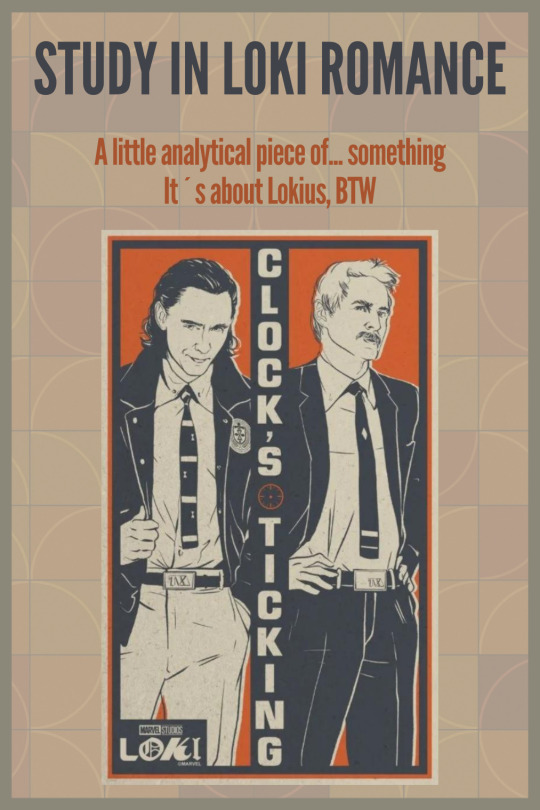
Since we're only a few days away from the last episode, I decided to COUNT DOWN everything we´ve got so far ( that can be interpreted very easily as romantic ) and discuss what the actual fuck is going on with second season.
Because even though I shipped lokius practically from S1E2, I absolutely did NOT expect this kind of development. (Not that I´m complaining)
Warning: This is gonna be LONG post, lots of screenshots, lots of SPOILERS, lot of "oh-my-god-they-so-cute" language, and little bit of meta.
I originally thought that this post would be everything at once, but since I have just too many screenshots this time around, I´ll have to split it.
so every post will be one episode.
Color coding means:
IIIIIIIIII = anything, that coud potentialy be just acting choice.
IIIIIIIIII = everything else (tzn.: whatever was written, and/or carefully prepared by filmmakers. )
side note:
I already wrote, about how amazing it is, that Mobius is unable to fight but fights anyway and how beautifuly, and ridiculously brave he is HERE. But this is about Loki/Mobius interactions, so I´ll try my best not to talk about THAT. (Even when I´m really happy, that s2 continues with this formula and Mobius is still his completely defenseless while aggressively brave self. I love him, btw.)
Soooo EPISODE 1, le´t go:
1)"Mobius It´s me!"
few second in and we have slowmo chasing scene with detail on Loki, and Mobius and then THIS Loki´s heartbreaking look on his face here.

2) "Tell me, you recognize me!"
(Loki trying to desperetly find Mobius, and then running towards him)
Also If this Time slipping didn´t triggered anything external, but It´s just his own, unlocked power - I honestly don´t know, how they will explain that - does that mean, that he unknowingly unlocked this power, because he was send by Silvie into the past, and then he was simply desperete and Mobius couldn´t recognized him so his body reacted by time slipping to place and time, where Mobius would know who he is???
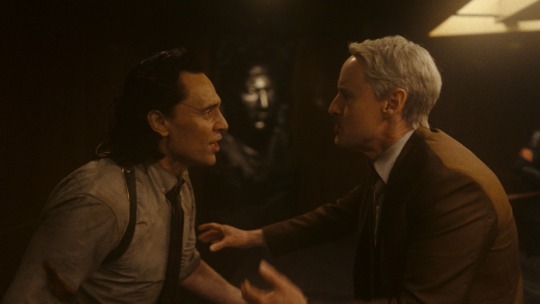
3) this very unexpected exhibition of touches
(meaning Mobius practicaly glueing himself to Loki for this entire section)
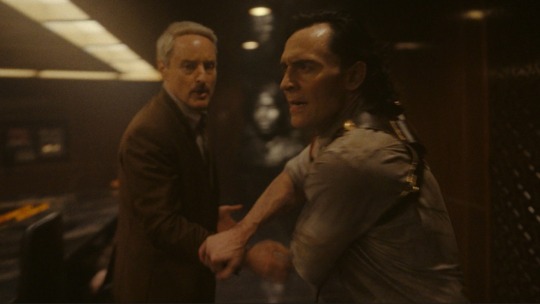
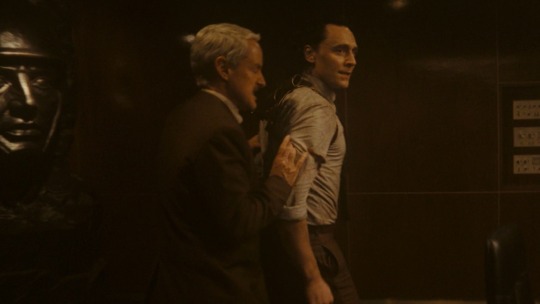
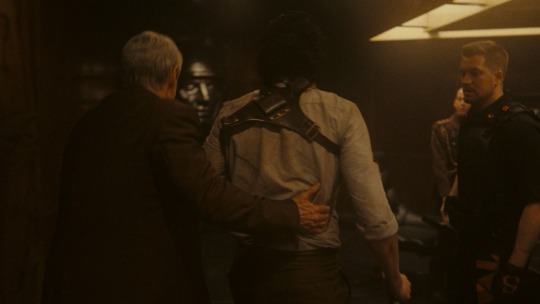
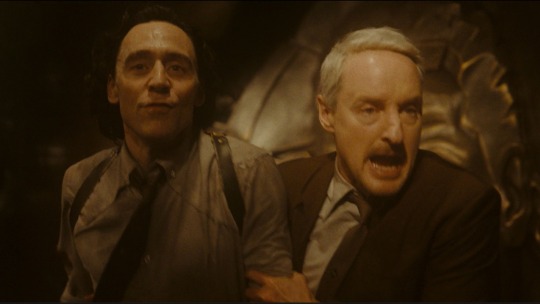
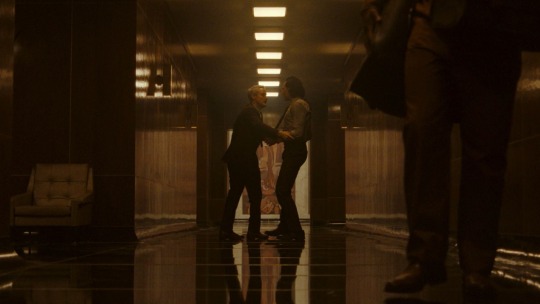
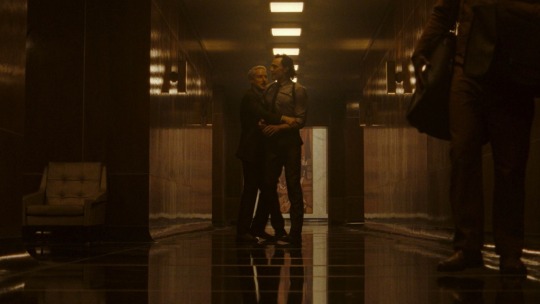
I´m sorry, but my man here is like "no, I´m not about to let you have a personal space. NOT. AN. OPTION. let me hold you some more" xD
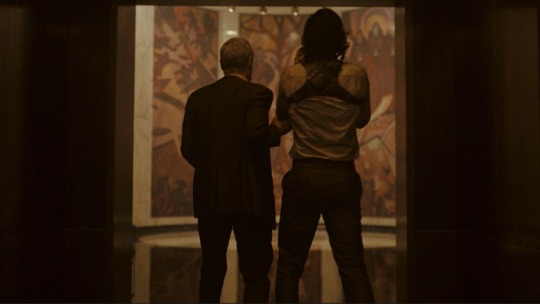
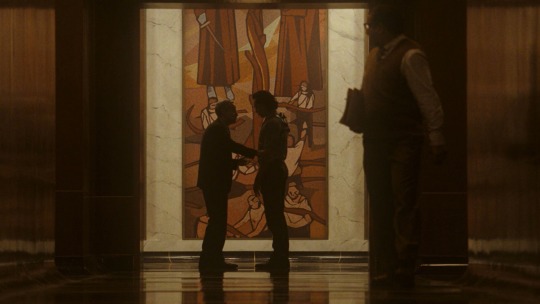
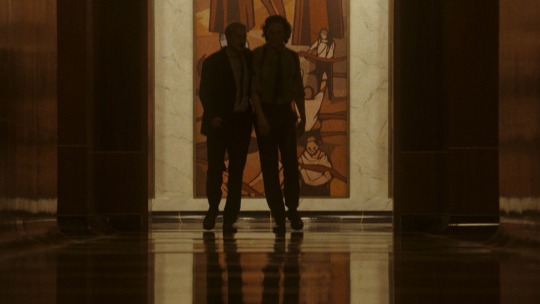
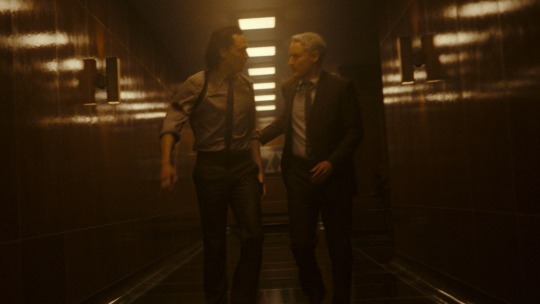
4) This scene in in an elevator
first of all, that was a second time, he slipped and was RIGHT back with Mobius, the very next second.
secondly: Mobius being scared for Loki and insisting he needs immediate help
thirdly: Loki reassuring Mobius, It´s not that bad.

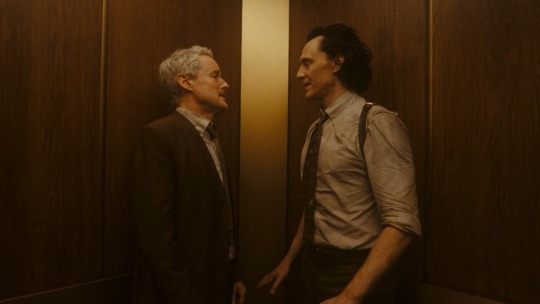
also this "we just had sex in a cabin" shot:
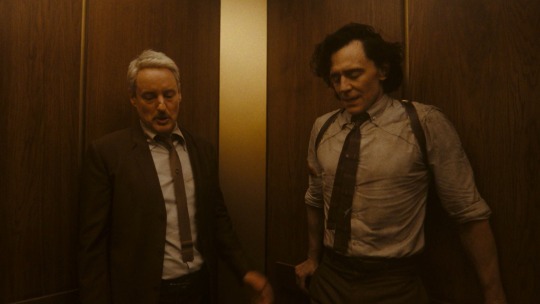
and lastly...
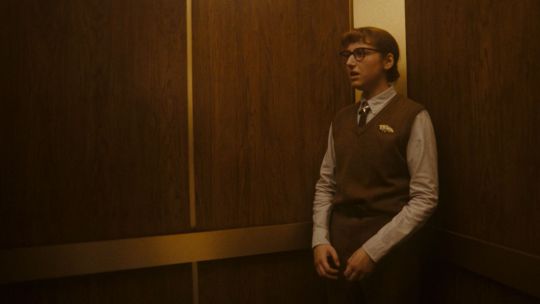
Big thanks to the film crew for this shot to give us an idea just HOW MUCH OF AN UNUSED SPACE was in the elevator! 👌
5) Mobius and Loki talking to OB.
being perfectly coordinated team and smoothly working together, while standing on a same spot, but in a completely different time.
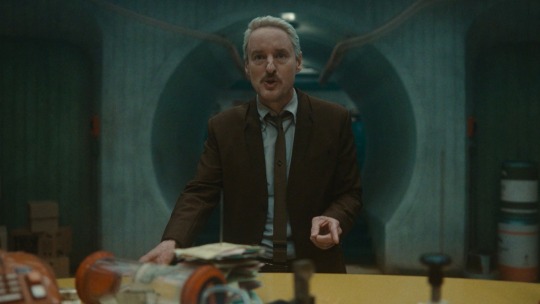
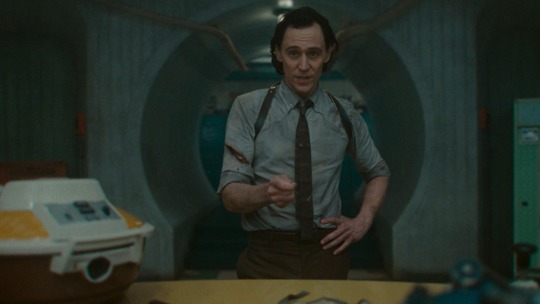

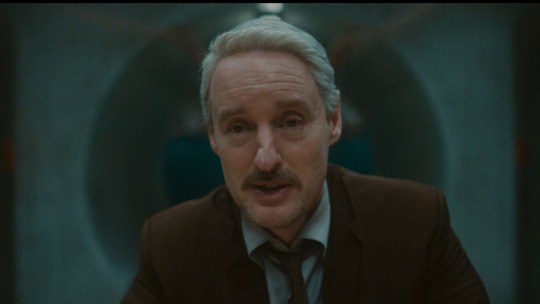
poetry... just poetry!
6) Distressed God and his Happy Face
just so we know: how long is it, since their reunion? Because I would swear that not even five minutes ago Loki was in state of complete panic, and look at him now:
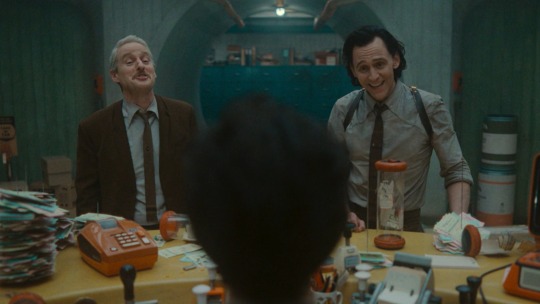

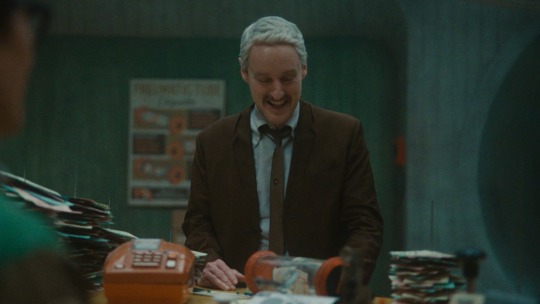
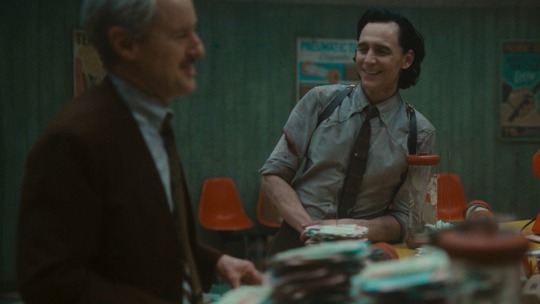
Look at him smiling, enjoying view at struggling mobius 💚
few minutes with this man, and HE forgets all about his trauma and just vibing.
me too, Loki. Me too 🥲
btw, this thing over here?!!!!
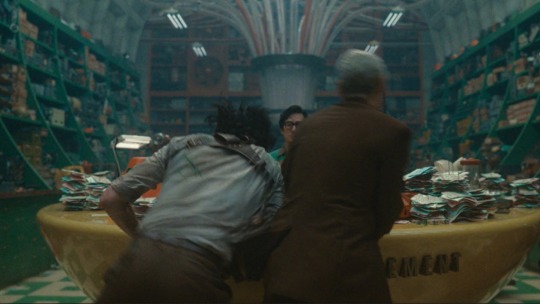
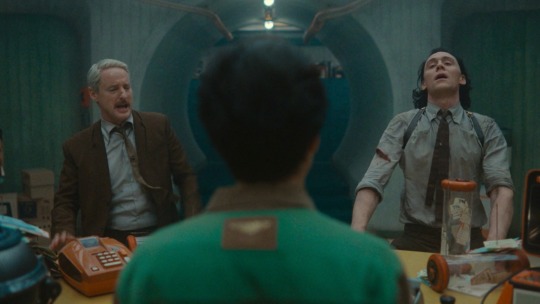
7) bickering, like married couple, part 1
8) "Mobius if I don´t make it back" and "You´ll make it back".
What was it, what where you about to say Loki? It sounded important! next time TALK FASTER!
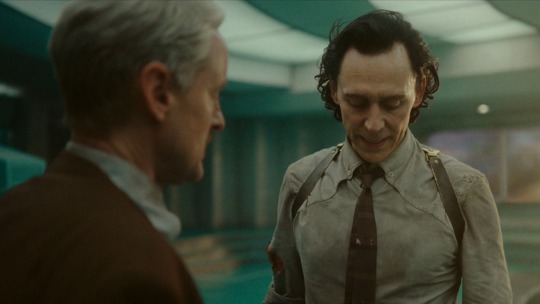
9) Mobius risking his life SKIN for loki and refusing to give up on him.

10) Loki saves Mobius in an epic fashion and they end up in a hug:
also they roll around the floor together
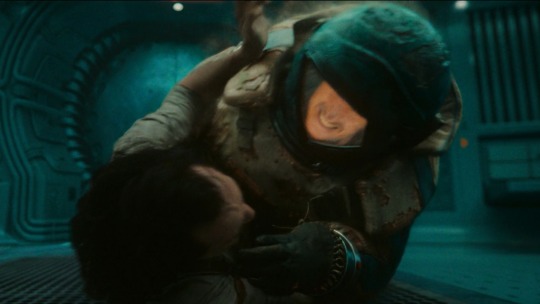
I mean... this whole scene was absolute TOP!
So yeah. That was a first episode. before the premiere I was litteraly hoping, that I will see our Loki and our Mobius together at least ONCE, before first end credits.
I actually couldn´t believe my own eyes, holy shit!
161 notes
·
View notes
Note
Hey there! I hope you’re having a good day. I just saw a post you made about Dream’s type romantically. Thoughts on Calliope and Dream’s relationship specifically? It always stands out to me how though Dream has had a number of lovers throughout the millennia, Calliope is the only one he married. (And of course, Melissanthi Mahut and Tom Sturridge’s blistering chemistry in the show is an additional component for me xD but feel free to respond only based on the comics if you wish!)
Hey, always happy to see your asks in my inbox!
So, first of all; I don’t care what everyone else thinks:
Dream and Calliope are the OTP even though I’m not a shipper. There, I said it, hit me over the head with a hammer, I live well in that tiny little corner of fandom 🤣
Conceptually, they are very, very alike. There is definitely something in there about dreams marrying epic poetry (and eloquence!) that’s just so on the nose.
But I also can’t help thinking: Slight power imbalance maybe, and we also get this more directly via the “all gods get born and die in the Dreaming.” I think often about how this would have played out for them once Calliope’s last worshippers have died—it’s certainly a tough one, even if their relationship hadn’t soured.
But even so: She is the Muse of Epic Poetry, he is the Prince of Stories, so there is A LOT of overlap between what they stand for. And hence, a lot of mutual understanding. They always struck me as *getting* each other (probably why they fell in love in the first place)—until they didn’t. The fact they didn’t live together was good for them I think, because thoughts need to be allowed freedom to form and develop. Plus, there’s also a lot to be said for Calliope keeping her independence that way. Not just in terms of personhood, but again if you think of how she was essentially created in, and will return to, the Dreaming. It’s probably wise for her (in conceptual terms) not to hang out there ALL the time?
She seems a lot more grounded in the mortal world than Dream is though. I always thought that was down to the fact that humans know her, as in actively worship her/ask her for inspiration, which must make her much closer in a way? Because bar a few, no one really *knows* Dream exists, although everyone does, if that makes any sense? Mortals know him on a subconscious level (that’s why he’s forever nebulous and *lonely*), but people know Calliope as a deity and seek connection explicitly. I’m not sure what I’m trying to say here, but to me, that was always a reason why, although a goddess, she seemed far less removed from the mortal plight than Dream was (at least when they were still an item—we all know he changed, even if he didn’t admit it [well, he did in the end to Nuala, which is a whole ‘nother topic]).
And when I think about why they didn’t work out, I can only think: “Orpheus”.
I mean yes, she said that they were already starting to drift apart slightly before she was with child, but there was still a lot of love between them even so. I think the death knell was to have a child on these wonky foundations. Why they did, we’ll never know.
Conceptually, there’s again something very deep and painful about dreams and poetry becoming something real. And then, that mortal child becoming immortal (until his father finally intervenes). But Orpheus was still all mortal and human to his core, even when he became immortal for a while, and that was *always* at the base of their rift. But I digress…
Back to why was Orpheus the death of their marriage? Dream’s advice to Orpheus was sound, yet it was unfeeling and lacked empathy. Calliope’s was maybe (?) not as reasonable, but she understood her child because a mother’s love is (usually) unconditional. We all know Dream’s wasn’t for a long time although it should have been.
I think if they’d all sat together as a family, supported their son in his grief in a balanced way, this whole catastrophe could have been avoided (I mean no, not really—it’s a tragedy, “doomed by the narrative” and all that). But all of Dream’s relationships (be that to his son or his lovers) fail because he is unreality (hence he has a hard time when things quite literally get real), and despite *knowing* mortals on a very deep level, I don’t believe he truly *understood* them at this point. But I think Calliope did—maybe due to who she was, maybe just because she actually *allowed* them in? Because Dream never truly did that. And when he finally did and truly understood what unconditional love actually means, he came apart at the seams and unravelled.
There’s also something really interesting conceptually in thinking of the Prince of Stories who doesn’t believe he has his own, and the Muse of Epic Poetry who inspires. Who is trying to control whom in this scenario? It’s mirrored in how they behave when the whole Orpheus tragedy takes off:
Calliope tries to inspire and, dare I say try to control the narrative a bit, and I don’t mean this in a bad way, quite the opposite: She looks for the most favourable outcome for everyone involved, even if it means bending the rules: She tries to convince Dream to put in a good word with Hades and believes he would listen because Gods respect him and, dare I say it, are even a bit scared of him.
Dream is rigid. Which is so mind-bending for someone who is the personification of hopes, wishes and possibility. But he is an immovable object: If he’s right, he’s right. That’s the rules, that’s it. And he won’t bend them, not even for his son. I’m not saying that it’s not understandable from his point of view, because he might know things we don’t (potentially also that although he *could* bend the rules because he has the power to do so, it might have knock-on effects no one else can understand or see—it’s impossible to say), only that they are fundamentally different in their approach although they are *both* about inspiration. And inspiration is so closely related to bringing on change (ouch!).
Part of me wants to say that Calliope uses it to control the narrative while Dream doesn’t, that Calliope believes that we can change our destiny while Dream doesn’t, but that’s also too simple. Because Dream *can* be controlling, but in totally different ways and areas.
I feel like I’m rambling out a lot of unordered thoughts, but I guess what I’m trying to say is that Dream and Calliope were so close because they are so similar in so many ways bar one:
Their understanding how inspiration can be used to bring on change. I would somehow go as far as saying that Calliope understands what it means to have personhood, also for herself, and that’s why she understands it in others (I think this is made *very* clear when Richard Madoc holds her hostage). Dream doesn’t—least not at the point where it would have mattered with regards to their relationship, because I think the fishbowl has changed him in that regard. This is also why he wants to make things right with her I believe. But of course he would never openly admit it (he basically stops himself before blurting it out), simply because it would also mean he’d need to admit it to himself…
With regard to that meta:
I definitely think they were highly romantically attracted, purely down to who/what they are. I can’t say too much about their sexual attraction, but after Calliope’s speech at his wake, it would be somewhat unlikely to assume they weren’t 🙈🤣
Was it unconditional though? No.
Was it pragmatic (that sounds so bad and unfeeling, but it’s not a bad thing, because a certain level of pragmatism is what grounds love in reality and makes it last)? I think they tried. But ultimately, he can never live that way because he is unreality, and I often wonder if they both knew 😭
@two-hands-toward-the-sun ask answered
#the sandman#sandman#dream of the endless#morpheus#sandman meta#calliope sandman#calliope#sandman analysis#sandman character analysis#ask answered#asks always open
39 notes
·
View notes
Note
https://www.maxmag.gr/politismos/archaies-ellinides-mystika-gyro-apo-ti-zoi-toys/
Found this article about the lives of women in Ancient Greece, and i liked for a chance that they didn't only mention how confined they were in houses (mostly yes). Fortunately they mention that many women were able to go to schools like men and have high education and been taught even among the best.
The sad thing is that history often forgets to mention them. In schools they don't mention at all the women philosophers, mathematicians that broke the stereotypes, which is a shame. If we want an equal society, children should be taught the same about these great women. They were and still represent half the population after all, they contributed to society just as much.
Agree! While I am not as optimistic as this article, I too had expressed some time ago my confusion that women's significance and pivotal role in Ancient Greek art, mythology, literature and theatre do not exactly agree with how bleak historians describe their place in society.
The link is in Greek so I translate some main points that I could also "confirm" in other sources:
In the Metropolitan Museum of Art in New York City, there is a gravestone on which is inscribed the name: ΑΘΗΝΑΪΣ ΘΕΟΦΙΛΟΥ ΚΕΚΡΟΠΟΣ (Athinais Theophilou Kekropos). Also inscribed on that ancient tombstone is the following epitaph: “The whole world of Athens cried for me, for my youth, my ethos, my virtue, but mostly because I was taking so much care and attention for my education and wisdom. The tears could not stop flowing from my father’s eyes, who lost the joy of his life and also the loving hands that would have been next to him taking care of him in his old age. My age at the time of death: 20 years old.” This shows that there were women who earned the community's respect through their love of education and knowledge and that the loss of a young woman could make the city grieve. The epitaph is clearly written by the heartbroken father.
Basic education for little girls included writing, reading, lyric and epic poetry, dancing. Teenage girls were taught by their mothers household management, weaving, handicraft and decoration. Rich girls could also attend private lessons to study music, singing and string instrument playing. Pythagoras and Epicurus welcomed women in their communities and academies, and we have found the documented attendance of at least two women in Plato's academy. Women could also get educated in the medicine schools of Kos, Knidos and Alexandreia.
Women took care of their appearance with fashion, make-up, elaborate hairstyles and the production of perfumes. Beauty pageants were taking place in some cities.
They had a lot of rights and influence in religion, they had some rights and presence in secular events. They didn't have political rights but women earned those very recently in time worldwide.
Noble women by birth had a status respected as much as that of their noble male relatives. Several very big and / or luxurious tombs of women have been found.
Important women you should learn about are: Aglaonice of Thessaly, Agnodike, Axiothea of Philus, Arete of Cyrene, Arignote, Theano, Damo, Hypatia, Themistoclea, Phintys, Lasthenia of Mantinea.
Professor Terry Brown, of the Faculty of Life Sciences at Manchester University, has argued the traditional takes of historians on the extreme Ancient Greek patriarchy reflect their own misogynistic views rather than the exact historical truth.

#greece#women#women in history#ancient greece#history#ancient greek history#link#anon#greek history#mail
81 notes
·
View notes
Note
oo now im interested in that apollo is chb'd patron thing would you care to elaborate on that??
@stereden also asked this! There's not so much canon for this as some of the other things I've talked about but there's still a few things to say on the topic, and not only am I going to talk about him being the patron, I'm going to talk about how that works with the things that happen with CHB during the PJO series, and of course because we're talking about Apollo, there's the odd little titbit from TOA that makes its way into this, too.
A lot of this will be extrapolation, but I've done my best to keep more floating headcanons out of it, so this should at least all stem convincingly from canon.
I'm going to address two things under this umbrella, because I think they're related and also because I find them fascinating: Apollo as the patron god of CHB, and Apollo's loss of jurisdiction over CHB by the events of canon.
So, Apollo and the patronage of CHB. While Camp Half-Blood Confidential is pretty goofy and daft in tone, it gives us a few important little nuggets of information regarding the founding of the camp, namely that it was Apollo's idea - or at the very least, Apollo foresaw that it would happen/needed to happen.
As it turned out, giving Apollo a centaur-back ride was the smartest thing I ever did. Unlike others of my kind, I didn’t belong to a specific tribe. I was a loner…and, sometimes, lonely. We bonded during that ride. I found that Apollo could be quite charming one-on-one, when he wasn’t trying to impress his adoring throngs of fans. When we got back to the cave, he said something that changed my life.
“Uncle Chiron, I’ve decided to teach you some stuff.”
Perhaps he found the idea amusing: a nephew teaching his uncle. Or maybe, being the god of prophecy, he suspected I had an important role to play in the future of Olympus. Whatever the reason, he chose to share his knowledge with me.
At first, he showed me simple things, like how to nock an arrow—“Aim the pointy end away from your body”—and how to bandage a gushing battle wound. He taught me to make a lyre, play a number of hits like “Stairway to Olympus” and “Burnt-Offering Smoke on the Water,” and even compose my own lyrics. Once, in an effort to refine my poetry skills, he sent me on a quest to find a rhyme for arugula so that he could finish an ode to a mixed-green salad. The best I could do was pergola. Apollo called my effort an “ode fail”—the ancient precursor to today’s “epic fail”—but he continued to work with me.
The lessons went on for a year. Then one day, Apollo showed up at the doorway of my cave with a half-dozen young demigods. “You know all that stuff I taught you?” he asked me. “It’s time to pay it forward! I’d like you to meet Achilles, Aeneas, Jason, Atalanta, Asclepius, and Percy—”
“It’s Perseus, sir,” said one of the young men.
“Whatever!” Apollo grinned with delight. “Chiron, teach them everything I showed you. Y’all have fun!” Then he vanished.
I have high doubts that this is exactly how it went down - I don't think those six demigods were all direct contemporaries of each other, mythologically, for starters - but they were all trained by Chiron and it makes sense for Apollo to be the one to introduce them, especially as he's the one that trained Chiron in the first place, and paying things forward is not a new or novel idea, especially when it comes to knowledge (after all, that's how teaching works even now - kids learn things, grow up, the next generation of kids start learning from them. That's just how humanity works).
From here, of course CHB continues to expand until it's the camp we know and love today. Chiron details this out for us (again, I don't believe the actual way he tells it, but the basic facts if not the very fictionised retelling seem solid). I won't copy out all of that, but I will make note of Apollo's direct involvement within the expansion, that that's the addition of the satyrs:
The satyrs arrived en masse with this note from Apollo:
I predict that in the future, demigods won’t be able to find Camp Half-Blood on their own. The world will simply be too large, too populous, and too dangerous. When that time comes, send satyrs to track down your prospective students. Satyrs can find anything. They recently located a herd of cattle Hermes stole from me that even I couldn’t find. Trust me: you need seekers, and they’re the goats for the job.
Apollo is the one that's actively looking out for future demigods and their safety here. It's understandable that he's the one that knew it would be needed, because of his foresight and prophecy powers, but the fact that he acts on it so early, making sure the Camp is fully equipped to handle it with the satyrs long before they'll be needed, shows that side of him that he tends to not advertise in modern times - the side that wants to look after and protect the demigods.
That's two of the most important parts of CHB - its existence, and the satyr protector-guides - both directly attributed to Apollo himself, tying him more firmly than any other god to the camp. With this in mind, who else could possibly be the patron of the camp, if not for the god of knowledge whose own teachings are being passed down, and who actively worked to ensure the safety of future demigods?
The third thing is not explicitly Apollo, but considering the pattern it seems most likely, and that's the defences around CHB, back pre-Thalia's tree.
You see, I knew that so many demigods living in one place was like an all-you-can-kill buffet for monsters. Yet I had convinced myself that our campers needed no other protection than the skills we taught them. My pride had nearly been our destruction, but I learned my lesson. I immediately sent an Iris-message to Olympus asking for help. The gods heard our plea. The next day, a magical border settled over and around the grounds—a barrier that would both conceal the camp from unfriendly eyes and repel future attacks.
It's just the general "the gods" mentioned here, but considering that Apollo is the most involved god so far in the camp, if he isn't the one that did this himself (unlikely), he's certainly one of the gods that was involved in making sure this protection happened.
Another minor little detail to note is in the symbolism of the battle that occurs which prompts Chiron to request for aid here. To summarise for those who haven't read this story, the campers are nearly defeated, and it's only last-minute reinforcements from past campers that saves the day:
Then, just as rosy-fingered dawn peeked over the horizon, a new battle cry sounded in the distance. Former campers who had learned of our desperate plight now came charging to our aid.
The reinforcements came at dawn. Yes, I know that's a favourite trope in media (see the very memorable Battle for Helm's Deep in The Two Towers), but that doesn't make it any less fitting here - the camp was saved at dawn, which is the time when Apollo takes to the sky (and yes, by this time chronologically, Helios has already faded and Apollo is the god of the sun, according to Chiron's description of their first meeting:
“Ah…yes, Lord Apollo.” I tried to control the twitching in my withers. “Very weird indeed.” I noticed the sky was darkening even though it was only noon. “Not to be critical, O Great One, but shouldn’t you be driving the sun chariot right now?”
He shrugged. “Actually, I put it in park for a few minutes because Artemis is up there doing her lunar-eclipse thing.” He scratched his fashionably stubbled chin. “Or is it solar? I can never keep them straight.”
It's likely that this isn't long after Apollo took on the role, although of course he could have just been goofing around with the lunar-solar mix-up, but he is still, in this narrative, the god of the sun by this point).
The implication here is very much that Apollo's the one who called the older demigods to help (presumably the Ancient Laws are in effect at this point - in fact, that may even be why Apollo had to pass on the responsibility of teaching to Chiron in the first place, with the advent of the no interference Laws) which again adds some credence to the idea that he's also one of the gods, if not the god, who supplied the original defensive barrier for CHB.
So, that's Apollo's involvement in the original CHB, way back when, and I don't think it can really be argued any other way than that at this point, at least, he was the patron god of the camp.
But what about modern times?
Modern times gets more confusing. I still believe that Apollo is, on a technicality, the patron of the camp, but in practicality he no longer seems to have any jurisdiction over it.
He still keeps an eye on the camp - no matter how he tries to throw us off the scent in TOA, there are some slip-ups in his narration that give us a glimpse of the god who is not at all distant from camp emotionally, even if he's physically forced to be.
Over the centuries, I’d had many conversations with demigods
who wanted to know more about their absentee godly parents. Those talks rarely went well.
From this it's clear that he does spend time with the demigods at camp, historically (although not recently, which I suspect has a lot to do with Dionysus' forced presence, either because Apollo fears being reported to Zeus, or because there's a rule about only one Olympian god near the camp at a time). He cares about them and goes out of his way to reassure them - all of them, not just his own children.
He also remembers names. There are twenty two campers present during THO, including Meg, and during Apollo's narration we are given the names of every single one. The facts he gives us are precise, and the fact that he is able to perfectly recall every name after being introduced once (especially when we contrast this with Dionysus' refusal to get most demigod names right even if he's known them for a decade) implies a strong level of care. And no, this is not just because it's in winter and therefore Rick had a small enough cast number that he could afford to name them all - in TTC there is a similar number of demigods in the camp, yet Percy, who lives with these people for several months of the year, never gives us names. In fact, we learn in BOTL that Percy doesn't bother to learn some of the camper names at all. This is Apollo caring about these children.
“Let me guess,” I said. “Connor and Travis Stoll are the pranksters?”
From a nearby basket, Chiron grabbed a flannel blanket and spread it over his fake legs, though the ruby shoes still peeked out at the bottom. “Actually, Travis went off to college last autumn, which has mellowed Connor quite a bit.”
Not only does he know their names, he also knows their habits and personalities. That's not just a basic level of reading names off a roll list, that's Apollo being actively aware of the children at camp as individuals.
It's also shown less implicitly through his conversations with Chiron in THO. Chiron knows that Apollo cares about the campers - he opens their first conversation with this:
My old friend smiled, though his eyes were stormy and distracted. “Apollo, it’s good you are here. We need to talk about the disappearances.”
Literally Chiron's first thing is to bring up missing campers, because he knows Apollo will care about this - and Apollo does! It isn't Chiron who continues this topic of conversation, it's actually Apollo who keeps trying to bring the topic back around while Chiron talks about Python and Delphi and prophecies:
“Chiron,” I said, “this is Meg McCaffrey, my new master and wellspring of aggravation. You were saying something about disappearances?”
“Disappearances,” I prompted. “What has disappeared?”
“The disappearances, yes.” I wiped drops of tea from my pants and tried to ignore Meg’s snickering. “Tell me about those.”
He asks about it three times before Chiron finally gives him the information he's after - it's actually the thing he's most insistent about focusing on in the whole conversation (he keeps trying to dodge the discussion of Python and Delphi) - and even after that it's the one he keeps asking more questions on, trying to get more and more information. Apollo never says so in as many words, but it's clear that he's very worried about the missing campers (a façade he more or less manages to cling to until his own children are added to the number, at which point the façade collapses entirely and we see Apollo in full worry mode over the children).
So the question is, if Apollo is the patron god of Camp Half-Blood (and let's not forget his domain of protector of the young, here!), why did we never see him in this capacity during PJO?
Quite frankly, it's obvious that he can't. It's impossible that, if Apollo had any say over the matter at all, he would have allowed the sacking of Chiron in SOM. He also sends no visible aid during BOTL, but the Daedalus thing is interesting... But let's start from the top.
Apollo has lost jurisdiction over CHB by the time PJO begins. I would argue that this is a relatively recent development - there are conflicting canon statements regarding how long Dionysus has been at CHB (in TON, Apollo says he's been there for half a century but then later we get confirmation that Dionysus' punishment is far from over, yet in PJO his sentence was cut in half down to fifty years - my personal guess is that Dionysus has been there for around 15 years or so as of TLT, long enough that all the current campers have known him, but as his only known children are fifteen or older in TLT (Castor and Pollux are seventeen in BOTL, two years later, Dakota is a similar age to them) the implication is that he hasn't had any children since his punishment began, otherwise why the lack - considering his far from PG domains, Dionysus is a god I'd ordinarily expect to have a lot of children). However, Dionysus' tenure as Director of CHB likely prevents Apollo from getting too close to the camp for any length of time, as I mentioned earlier.
The biggest thing, though, and what I think was the final nail in the waning coffin of his jurisdiction, was Thalia's death. This is when Zeus put a very large, aggressive stamp on CHB - his daughter is the one guarding the camp now, through Zeus' own actions. By doing this, Zeus has completely muscled Apollo out, and we know that Apollo can't (and is too afraid to try to) challenge Zeus.
So, why would Zeus be so determined to claim CHB as his, and kick Apollo out? There's a few reasons. One is his ever-present paranoia. CHB is a major part of modern day demigod society - barring CJ, which is Mars' and the Roman equivalent, it is the most major part. The amount of power and influence it gives Apollo to have it under his control is huge, and we know Zeus fears Apollo overthrowing him (this is also why cabin eleven is the cabin for the unclaimed demigods - while the logic that Hermes is the god of travellers does hold water, as the camp patron and protector of the young, it would actually make far more sense for them to go to cabin seven. The only reason I can see why it wouldn't, in-universe (meta-wise it's clearly to build the Percy-Luke rapport in TLT to give the betrayal the oomph it needed), is if the other gods refused to let that happen. Considering they all seem fine with leaving their kids languishing in Hermes' cabin, they probably don't really care which cabin it is, as long as it's not their own - Zeus is the only one who has reason to protest against it being Apollo, and he has the clout to make sure he's obeyed on this).
Well, I say one reason is his paranoia; really, a lot of this is based on Zeus' paranoia, because all his interactions with Apollo are steeped in this throughout the series. Another aspect of his paranoia is the Great Prophecy - he wants his own child to be the Hero, but when Thalia dies, he's left in the horrid realisation that it might not be his child; Jason is still very young (and also a son of Jupiter and therefore Roman, and the Romans don't even have this prophecy), and if he's broken the Oath, there's a high chance at least one of his brothers has (whether or not he knows about Percy's existence this early is debatable, but from the way the accusations at theft were immediately levelled at Poseidon before Percy even knew he was a demigod, it's likely that the Olympians were aware of Percy's existence at least a little before the events of TLT). A child of Hades would be a problem, but Hades' kids aren't popular so he might see them as less of a concern/easier to get rid of (Hades also doesn't seem to like sending his children to camp - he explicitly refused to send Bianca and Nico to CHB). A child of Poseidon, however?
Remember that Poseidon and Apollo have historically worked together to oppose Zeus. A child of Poseidon central to a great prophecy in a camp that's under Apollo's jurisdiction is, to Zeus, a terrifying combination and one he won't want at all, so he uses Thalia to wrest the control of camp away from Apollo. Now Zeus is the one in control, and we know Zeus doesn't like giving control back. (And remember that in TLT the Apollo cabin back Poseidon... against Zeus; that can't have pleased him in the slightest!)
Of course, there's also the same power basis in his favour - he doesn't want Apollo to have that power, but he does want it for himself. The gods have all been waning compared to their original selves, and their powers are far weaker. During PJO, all of the gods are, if not pathetic, clearly weakened. It's only at the end that we see Poseidon and Hades regain their strength (the same way we see Apollo regain his in TON), while Zeus continues to wane.
So, what does Apollo do about this? He can't fight back against Zeus - TOA is a spectacular example of what happens if Zeus even thinks he's rebelling - but while the functionality has been stripped, he is still the patron of the camp, and also the protector of the young. Apollo doesn't sit back and do nothing.
First of all are the dreams - we know Percy gets a lot of demigod dreams, we know Zoe gets a dream while in CHB, we know Apollo kids get dreams, we can infer that Chiron probably also gets dreams (I'll get to this in a sec), and also that he knows about the dreams (once again, see @fearlessinger's discussion of our theory on Apollo and the Demigod Dreams).
Secondly, there's Octavian.
Now, it took me a while to try and rationalise Apollo's apparent desire to work with Octavian, especially considering the way it ends up with Octavian trying to kill the Greeks (who are under Apollo's patronage - this, at least, must have been a misunderstanding because there's no way Apollo ever approved that), but when I sat back and looked at how powerless Apollo is in PJO, it makes sense.
Firstly, there's his inability to help Artemis directly during TTC. As this is a gods and titans problem, primarily, the Ancient Laws shouldn't actually prevent him from doing this - the only thing that could be clouding Apollo's sight and keeping him out are the Fates themselves - but Apollo is still unable to do more than effectively send children to their deaths (Zoe is admittedly not a child, but Bianca is, and Apollo is the one who got them most of the way to the desert in TTC, although he isn't the one to actually drop them there).
Secondly, there's the mess that is CHB. Chiron is sacked and Tantalus (someone who kills children) is hired in his place (do I like the idea of Tantalus' punishment extending outside of the Fields of Punishment being Apollo's doing as a way to make sure the kids stay protected? Yes, I do - but there's no actual canon for this although Tantalus finally getting his hands on food right at the end, when Thalia is restored and the power in the tree is now purely Zeus', is a very stretchy potential link to the last vestiges of Apollo's influence in any capacity being broken off). This is all around Bad News for CHB and nothing Apollo could possibly have approved of. Then in BOTL the camp is literally attacked and children die (including one of his own).
Daedalus is suspicious as heck the whole time, and Chiron is clearly very suspicious of him - and yet, he does nothing (even though Daedalus was posing as a Roman adult demigod and it highly amuses me to think of the panic Chiron must have been in about one of the smarter kids asking the right/wrong questions). I was discussing this with fsinger the other day and the conclusion we came to is that Apollo may have been the one to assure Chiron that Daedalus had not - yet - joined with Kronos and was therefore safe to have around the kids. After the mess of Tantalus, Apollo would no doubt be keeping a very close eye on who was being allowed near the kids, after all (and as he can't directly interfere, the most likely method of imparting this information would be via dreams).
The fact that Apollo has been dragged off monster hunting by Artemis on Zeus' orders, thereby keeping him away from camp at the time when they need godly protection the most also plays a significant role here (Dionysus, too, was elsewhere on Zeus' orders, which makes one side-eye Zeus very heavily at this point).
Overall, Apollo has lost a lot of power in recent years, and he's desperate to regain at least enough to be able to protect Artemis and CHB again - power which he would get if the Romans started worshiping him higher, because the gods are clearly fuelled by belief (notably, at the end of TON, Apollo has regained his belief in himself, which is even more powerful than belief from others, and makes me wonder if he could now regain his jurisdiction over CHB back from Zeus). This neatly ties in the Octavian side of things in HOO.
So, in conclusion: Apollo is the reason CHB exists, he's been consistently shown to care about the demigods right from its inception to the modern day and protects them as much as he is able to, which makes him the clear choice for patron of the camp. However, Zeus' paranoia has prompted him to muscle Apollo out of any practical patronage (although he is, technically, still the patron even if he can no longer act on it), leaving Apollo desperate to regain the patronage and protect the demigods however he can without directly defying Zeus.
#Anonymous#stereden#pjo apollo#percy jackson and the olympians#pjo#heroes of olympus#hoo#trials of apollo#toa#riordanverse#rrverse#pjo chiron#pjo zeus#pjo octavian#chb#camp half-blood#tsari analyses things
377 notes
·
View notes
Text
Fic authors self-rec
Tagged by @ms-katonic-of-tamriel! Thank you!
Fic authors self rec! When you get this, reply with your favorite five fics that you've written, then pass on to at least five other writers. Let’s spread the self-love!
Well, heh, I don't have 5 fics published in the Elder Scrolls fandom, so I'll give a rundown of the one I have published a chapter for.
Aristeia - This fic is a retelling of the Odyssey but with the Orcs of Mor Khazgur. I am ridiculously proud of the plot I've conceived - it was one of those times where I could not write my notes fast enough because everything just fit perfectly into the story beats of The Odyssey in a way I didn't anticipate when I started out. I also set a challenge to myself to use no OCs - all characters are either NPCs from Skyrim or characters from Homer (with names suitably Tamriel-ized.)
The title is the word for the scene in an epic poem where a warrior achieves excellence in battle - in this case, it's a reference to Borgakh coming into her own as a warrior and member of the stronghold.
My goal in the fic is to build around the bits of orc lore we get from the TES games, and informed by my own experience of growing up in a very insular, fundamentalist religious sect. The strongholds in Skyrim seem to be much more conservative than they were in the past - there are examples of female chiefs in ESO, after all. I'm interpreting this as a backlash against the Trinimac cults that have tried to "bring back" the orcs into the Aedric religious sphere, and as a reaction to the Oblivion crisis. Obviously we never see what happened to the strongholds in Skyrim, but it makes sense that strongholds would have been a target for invading daedra, and that those who had the best warriors and strongest defenses survived with the least harm. Events like that are classic catalysts for increasing conservatism and isolationism in communities.
So yeah. Aristeia is (going to be) a culmination of my love for ancient Greek epic poetry, and all of my thoughts about orcs.
I am tagging @thana-topsy, @mareenavee, @dirty-bosmer, @gilgamish and @paraparadigm
13 notes
·
View notes
Note
Do you think that Fëanor and Maglor bonded over writing? I mean, words were a significant thing for the both of them, whether through linguistics or music, and I love imagining young Mags showing/singing songs to his dad to get criticism and compliments from the person he values so.
I most definitely do!
I actually have a headcanon that Feanor is surprisingly bad at poetry. Not like, bad bad, but out of everything you can do with language, this is the thing he feels the least naturally comfortable with, and that’s part of why he greatly values Maglor’s talent. Which doesn’t mean he hypes up whatever Maglor does - no, no, that’s not Feanor’s love language. In my mind, Feanor actively studies the theory behind poetry so that he knows what to demand from Maglor - and I do use the word “demand” here very intentionally.
The indescribable thing that elevates skill to genius is Maglor’s gift and Feanor will only ever encourage it, but the technical aspects? Oh, he’s ruthless about them. He sees it as his responsibility to help Maglor achieve the perfection all Feanorians are always chasing. Even beyond things such as prosody, you can bet Feanor is very demanding about things like not using a mostly-right word when there’s an exactly-right word available if you only put in some effort to find it.
And by saying all of this, I don’t mean that Feanor turns music into a chore. No, getting better at their chosen craft is bonding for this family - let’s not forget this household is spearheaded by Feanor and Nerdanel, whose love story is basically All About Shared Interests. Why wouldn’t they extend that kind of love language to their children?
Anyway, if Maglor wants to stay up all night three days in a row fighting a single unimportant verse in an epic that lasts like half an hour, Feanor is right there being a sounding board and, maybe more importantly, having full confidence that Maglor is right in expect so much of himself, he’s talented enough that he can achieve the result he’s looking for.
The mix of “I expect a lot of you because I trust you to be this good” and “I very openly beam when you succeed in little or big things” thing I imagine Feanor has going on just about ensures all his sons grow up very sure of their own skills. But I imagine that growing up (though that changes later), Maglor was particularly susceptible to wanting to please everyone - comes with being able to see many points of view, which comes with being a minstrel - so rejection of his art hits him in a way most of his brothers simply don’t. And to raise the stakes, because his craft involves performance, Maglor is getting people’s reactions to his subcreations in real time. But Feanor is a very demanding but fair audience, so if Feanor says he’s doing well, then that goes a long way in helping Maglor not zero in on the ONE (01) person in the audience who didn’t like his latest work.
And this is already long enough, but I actually have other headcanons related to this, so I’ll probably come back to this later this week
103 notes
·
View notes
Text
My June/July Reading Review
Not as excited to share this time, because I don't have as many books - or as much variety - despite being a double month. Life has been extremely busy, and I had to put my reading mostly on hold for a bit. This led to a reading slump even when things got more manageable, so I have been concentrating on getting out of the slump. I permitted myself to read lots of short, fun things in order to get back into the reading habit, as that has worked in the past and I know I'll be intentional about reading slightly more difficult works once the habit is re-established. But it does make me feel silly typing this up. On, then.
"Nicholas Nickleby" adapted by Tim Kelly (Play, literary adaptation) - FOUR STARS - As some may know, Dickens' novel is extremely close to my heart and figured into several important passages of my life. I was extremely keen to propose a Dickens adaptation for next years' school play, and was very impressed with this one. (Of course no adaptation will ever compare to the Royal Shakespeare Company's eight hour stage adaptation, which is possibly one of the best adaptations of anything ever, but if we're doing Nickleby in two hours, with students, Tim Kelly has done a pretty great job.) Alas, for financial reasons we need to go with a free script rather than one that requires licensing, so we're falling back on good old Shakespeare, but I am glad I got the chance to order this one in and read it.
Beren and Luthien by JRR Tolkien, edited by Christopher Tolkien (epic poetry, fantasy, mythology, Tolkien legendarium,) - FOUR AND A HALF STARS - My appreciation of the tale truly benefited from reading this anthology. It's remarkable to see how Tolkien's imagination reinvented itself over time. The first version of Beren and Luthien feels like an Edwardian children's short story, with Luthien the fairy hiding behind a flower from the gnome Beren, and singing a song of long things like ladders and vines and the lives of cats to magically give herself Rapunzel hair! And of course the absolute delight of the Sauron character instead being "Tevildo, Prince of Cats" who loves napping in the sun! The later versions have cool variation too - the poetry really emphasizes different aspects than the prose tellings. I also love the dignity and equality of both Beren and Luthien, and how they are equally heroic. Luthien especially is wonderful to me.
The Whispering Skull; The Hollow Boy; The Creeping Shadow (Books 2-4 in the Lockwood & Co series) by Jonathan Stroud (MG, mystery, adventure, thriller, supernatural) For sheer enjoyment, I'd give the second book 2 1/2 stars, and the third and fourth books 5 stars. They are for the most part intelligently written, and just such a blast. (The fun is enhanced by the fact that my brother frequently asks me to narrate the story to him (as opposed to reading it,) and so I get to unleash my love of storytelling. Book 2 is okay, but has middle book syndrome in a way the others don't. Books three and four have better plots and characterization on the whole. I read the scene at the Rotwell Institute at 2 AM during a terrific storm, and though it did not creep me out, I did get a nice suspenseful shiver! (These books don't spook me at all - suspense is really the operative word here.)
"The Mousetrap" by Agatha Christie (play, mystery) - THREE STARS (and that might be rounding up) - My sister had read the entire Agatha Christie canon save this one, as they were kind of her thing in her teens. I have not read as many, but I've definitely read at least twenty-five of her books, plus a large number of short stories and plays. But for many years we had a pact that we would neither of us read this play, because we had an ambition to travel to London and see it on its original run (now more than seventy years running!) at St. Martin's Theatre. Now we're both adults and very much have our own lives, and I am about to embark to England without her, so we decided it was time to mutually break the pact. We had meant to see a community theatre production February, but that fell through, so we made tea and had a spot of reader's theatre. We had tremendous fun, even though the play itself was only so-so - certainly by Agatha Christie's standards. Maybe we just know her too well as an author. That being said, the reader's theatre session was a hoot. We watched this trailer first:
youtube
and predicted what all the characters' personalities and backstories were just from the trailer, as well as the murderer's identity. We were correct on almost everything. It also added to the fun because we based all our character voices on the appearances of this cast. My sister stole the show, as far as I was concerned, with her comedic performance as Christopher Wren (the guy in the sleeveless pullover.) I think we actually had more fun doing reader's theatre than we would've seeing it in person.
The Frugal Wizard's Guide to Surviving Medieval England by Brandon Sanderson (science fiction, historical fantasy, dimension-hopping) 3 STARS. Fun, but really not Sanderson's best. As always with Sanderson, read it aloud to my brother, and the connection with him is always a good thing.
Ongoing:
Five Children on the Western Front (I can't wait to do my writeup of this one - it's really good!)
An enormous collection of Medieval and Renaissance Italian short stories. For some months I've been reading through the first volume of a multivolume anthology series of the world's great stories, organized by time and country. The first half of this volume was all ancient tales (and, with the exception of Cupid and Psyche, all stories not included in your standard mythologies and such.) Now I am in the second half, and reading all the stories Shakespeare used as inspiration for his stories. The original ending to Romeo and Juliet is... something.
Epistle to the Romans - I continue my slow deep dive, working my way through it with copious notes, two commentaries, sundry articles, etc.
Iphigeneia in Tauris by Euripides - I do mean to keep liveblogging this.
The Empty Grave by Stroud (last Lockwood of them all)
Beowulf (reread)
Fellowship (reread)
8 notes
·
View notes
Text
More thoughts on episode 5 Partings (part 1).
My first reaction is here (it contains more thoughts that i didn't used in this post because it's already too long, and i didn't want to repeat myself).
Because a troll has commented on my last post about The Rings of Power negatively, i feel obligated to add some warnings to avoid to attract more of them (sorry for the length):
Indeed I'm not a native english speaker. Actually, english is my third language and i'm not even living in a english-speaking country. Thus i can't deny that i'm far from being fluent, having learnt to write it mostly through very old high school lessons, films/series and articles read on line. But thankfully, my bad english doesn't seem to stop people from reading my posts, understanding them and even interacting with me politely. So i don't think, the quality of my expression is an issue, except for the trolls.
More importantly, my language skills have nothing to do with the fact that i enjoy so much The Rings of Power. I'm raving about it because it's the best tv show that i've seen in years. It's a 10/10 (for people who like to rank things), which means season 1 will be probably in my top 10 of the best shows of all the time (next to The Wire, Twin Peaks, Chernobyl, The Terror, Hannibal, Battlestar Galactica etc.)
Now that we have established that i know enough english to express myself at least clearly in this language; and that i have good taste in tv series (and literature, poetry and non fiction too by the way), and thus if i see no flaws in this series, it's probably because it's way better than the limited taste of the trolls, and their too limited capacity of criticism (that enjoying to much low quality content has lead them to form) allow them to admit - let get's back to episode 5!
This is the most epic episode since episode 1 and the narration of the war of Wrath against Morgoth by Galadriel and boy did i love it! Glorfinder (is he the elf warrior?) and the Balrog were something unexpected because the Tolkien Estate has established (last time i checked) that the First and Third Age were off limit for the show. So every time the producers managed to negociate more, it feels like a very special gift. An art gift in this case because the representation of the battle between the heroic elf and the evil creature looked like a painting by a great master.
And let's be honest, who didn't scream Gandalf too when watching it?! Who didn't think of the LOTR films? The call back to the fight between Gandalf and the Balrog in Moria in The Fellowship of the Ring was obvious, in an episode where the dwarves and the Mithril they found in their mines were essential to the resolution of Elrond's arc.
Loved too the scale of the final scene in Nùmenor where the ships left the harbour, which propelled the series on the level of epicness of the films. Everyone looked so pretty in the armors. I hate war and colonization as much as Eärien and Kemen (loved his courage, yes destroying the ship was brave), and yet i still swooned over the perfect looks of Elendil, Galadriel, Halbrand and queen regent Miriel, and totally got why the crowd wanted to applaud them.
But it's the plot (characters development and theories) that i really want to discuss. Going through this commentary character by character and their relationships (it's only the part 1 because i have too many thoughts and the episode was so dense).
Starting by Nori and The Stranger:
I'm convinced that he's Sauron since his spectacular entrance in episode 1 for many reasons (developed in a another post to come), but the most important is how much essential it would be for Nori and Poppy 's characters development to experience this level of betrayal and corruption. Corruption of every living being (including plants and animals) during the Second Age, by Sauron who helped spread evil in Middle Earth by tempting, deceiving and manipulating while his armies of Orcs are invading every region, being the main theme of the show in my view.
Nori has been firmly established as a young naive hobbit who wants to expand on her world geographically, but also on what she learnt from her community about surviving. Since she couldn't leave her family, she decided that the novelty and mystery should come from this old man who has fallen from the sky like an angel, and put all her trust in him to the point where she made him a part of her family.
In the process, she ignored Marigold and Poppy's advices ("there's common sense and nonsense"). It's because she's deeply connected to those two very wise characters and because their first strong impression was that the Stranger was dangerous and should be left where he was and they argued about it with Nori a lot, that realizing that she carried the true evil with her all along (just like Frodo did with the One Ring but without knowing it), and brought chaos in the all world by trusting a stranger rather than her close friend and relatives (unlike Sam and Frodo who knew what lies Gollum was spreading), seems in my view a necessary lesson for her.
All those elements once assembled, can make a consistent arc and are compatible with the fact that it would be the best option for Sauron to cross the Middle Earth unidentified and without unwanted attention. And who except the Hartfoots that are the species the most hard to detect can provide this level of quasi invisibility?
Meanwhile, their relationship is something as intense, ambiguous and sometimes manipulative than the one between Galadriel and Hallbrand: he saves her and then hurts her badly. Though i believe he was indeed just this time healing himself, and hurting her was an accident (she came too close) contrary to what he did to the Fireflies, which was a real killing. I'm not sure if this last incident will open her eyes to the danger he could represent or if she will ignore it like Galadriel does with Hallbrand. Will she rather follow with her initial choice because she can't stop either (she can only share doubts with Poppy), not now that they are so far in their travel and they still need him so much to push the cart?
However, despite my attachement to this theory, for the first time, this week i had doubts about the Stranger being Sauron. And it's all because of what happened in Lindon with the Tree.
On The Elves
There's one fan theory that places Sauron in Lindon, already deceiving the elves as a fake ally of Celebrimbor but existing off screen. I don't like it because it would mean that all the clues collected that designated The Stranger or Halbrand (since Adar is not Sauron as proved in this episode) would have been just a way to midslead us, until a final cheap twist that would break the continuity of the character development for shock value (which wasn't the way Tolkien used to write). But the Tree was literally dying, and i wonder if it could have been poisoning. It seems like an opportunity Sauron wouldn't miss: destroying the entire community of elves of Lindon (which is also the most powerful of Middle Earth) with one stone.
I'm on the side who isn't sure Gil Galad and Celebrimbor weren't lying about the Mithril. I don't see how it can heal the Tree or share its power with all the elves, no matter the intensity of its light. it didn't seem to have this specificity when Elrond was holding it. Howewer we know because of Bilbo (hundred years later) that it can be transformed into very solid armors and swords for a potential coming war. It would thus explain why Celebrimbor needed a massive forge so quickly. Not (only) to make some artistic artefact to gain fame but to arm an entire nation of elves warriors (my speculations are all based on the appendices of LOTR just like the show, not the Silmarillion so there's plenty of my ideas that are partially spoilers free speculations).
I'm satisfied that Elrond got the same treatment that he inflicted on Durin last week. He learnt at least the lesson: that you don't try to manipulate friends, you tell them the truth and work with them to find a solution. I don't think he deserved their reconciliation scene: as beautifully shot as it was (a autumn decor with big rocks for Durin to sit on and think, and a forest of trees to quickly and softly heal his pain and bitterness and rekindle the trust), it's hard to forget that Durin did all the hard work (forgiving and helping). Elrond is lucky that Durin has such a good heart and still cares a lot about him. No matter how much he tries, and what he said to Gil-Galad about his dedication to his friends, i think that he will never be to Durin the real friend that Legolas was to Gimli.
That doesn't mean the elves are irredeemable. Even Gil-Galad, between two "fashion shows" where he looked like a superstar in his magnificent silk dresses, managed to share some really wise view of the world on hope (actually a central belief in Tolkien's work), that proved that he knows the real power isn't in a rare ore, no matter how magical it is, but in the moral quality of the people they use it and the relationship they can build. His presence during Durin/Elrond reconciliation scene and what he watched seemed to have satisfied him, and not only because of Durin's acceptation to help. He enjoyed the friendly way in which they both have lead this "negociation".
The scenes he shared with Durin were pure gold! I would watch without question a show in which in every episode Durin would find a new thing to "stole" from him, for Disa, until he finishes to refurnish their entire home. The dinner scene was a very nice light comedy moment (Gil Galad's face was the best thing! I hope Disa will enjoy her table), a rare moment of pure humor in the show.
#the rings of power#episode 5: partings#elanor nori brandyfoot#the stranger#durin iv#the elves#elrond#gil galad#my trop reviews
35 notes
·
View notes
Text
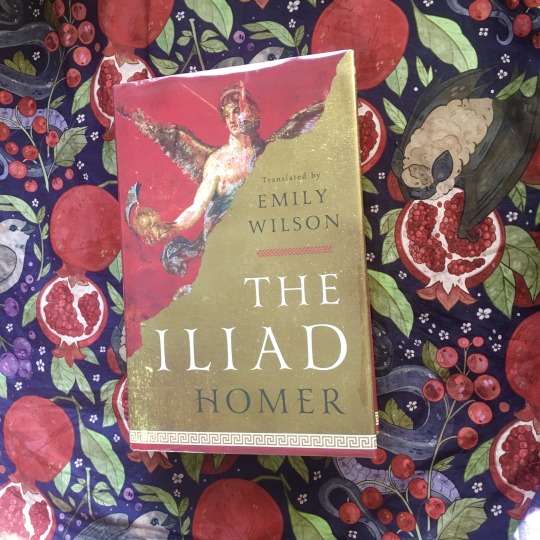
Homer’s Iliad translated by Emily Wilson - 3/5
I think I must have been assigned to read Homer’s Iliad on at least three separate occasions throughout my youth, and Sparknotesed it every time. Which I feel bad about, because I always did want to read it, or maybe I wanted the clout that came with being a person who reads Greek epic poetry. In any case, when Emily Wilson’s new translation was released last year, I finally went for it. I had read selections from her Odyssey and found her approach to translation very accessible and easy to read. There was a lot of media hype about “the first woman to translate Homer” which led to some reviewers claiming this was a feminist reinterpretation of The Iliad. My pet theory is that they had her confused for Maria Dahvana Headley, whose translation of Beowulf was intentionally transformative. In any case, Wilson’s Iliad is meant to be fairly traditional and accurate to the original text, including some metrical craft I could not pick up on. Compared to all the other times I tried to finish the Iliad, I found Wilson’s version a much easier read, so I would recommend it for that reason. The supplemental materials are also way more impressive than most editions and justify the extra cost over just a Project Gutenberg download. Wilson’s introduction is hefty to say the least, at around 75 pages, and was often more moving than the poem itself (She even defends the infamous third chapter, the Catalogue of Ships, imploring the reader to “read them out loud: in mouth and ear, the long list of names become music.” I find comparisons of superhero movies to mythology mostly kind of dumb, but I could see Homer’s audience going crazy each time their guy’s name is called in this chapter the same way people soyface about the Avengers or whatever.) She provides all the context for a beginner like me to understand the poem, but also includes an extensive glossary and notes for each chapter for those who want to dive deeper. The hardcover edition is around $40, so whether or not this masterful editing justifies the high price honestly depends on how much you like reading about guys getting stabbed over and over again. I just got it from the library.
The poem itself was not as impressive. A lot of armchair critics (NOT Wilson) love to claim The Iliad as an anti-war piece to make it palatable to modern audiences. This was not my impression in the slightest. Sure, the epic deals with the horrors of war, often brutally (as I said before, pages upon pages of vivid gory disembowelments) but it seems the product of a society which obsessively fetishized war. I’m not condemning the text based on this, but I do think it’s harder to understand without unpacking the very different set of values that were held back then, so it’s a lot easier to attempt to update the text in a really sloppy way. Wilson does give a really cogent explanation of these ethical differences which helped me understand the text more fully, but that doesn’t mean I agree with it. Every time the equivalent of a Star Trek redshirt got killed off, Homer would expound on his ancestry and life, and then conclude with something like
…Menelaus stabbed his forehead
above his nose, right at the bridge, and broke
his skull, and popped his eyeballs out.
I literally opened to a random page and found something disgusting on my first try. It’s incessant. But I can see how telling each person’s life story dignifies their death. Still, it is hard to feel any sympathy for men who did not see women as people, but as property, as goes the inciting incident of The Iliad.
5 notes
·
View notes
Text
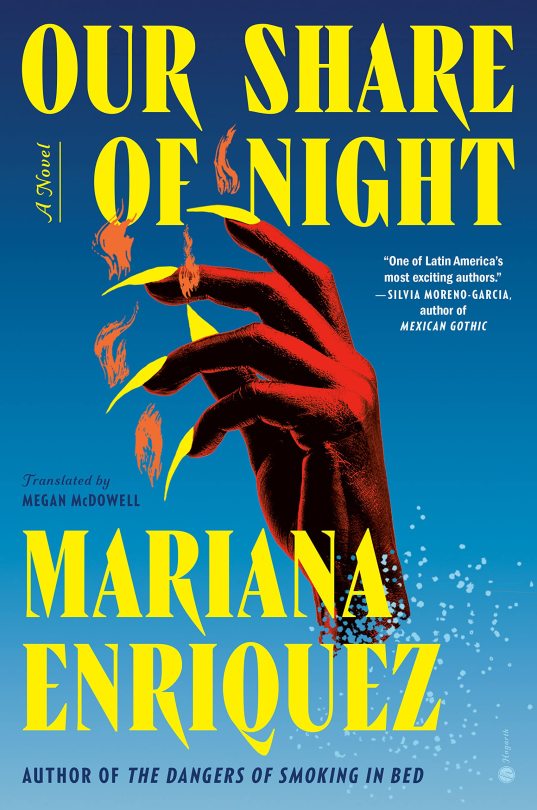
I accepted an ARC of Our Share of the Night from Netgalley. This is my honest review.
It's still January -- when I wrote this initially --
and I'm calling it now: It's highly unlikely I'll read a better horror novel in 2023. Our Share of the Night is an epic novel filled with body horror, trauma, friendship, familial love and hate.
We meet Juan, a recent widower, traveling with his young son, Gaspar. Juan is filled with love for his son, but also anger, and the ability to hurt his son and anyone who gets in his way. Juan is a "medium" for an international cult that worships a dark, cruel god -- perhaps Darkness itself. He has been given no choice in this, having been purchased from his parents as a child.
Juan has a heart defect that he knows will kill him sooner than later, and he knows this cult wants his son -- either as the new medium, or a new vessel for Juan. He's determined that neither will happen.
The book encompasses a significant period of time, and a number of POV characters. Eventually we meet up with a slightly older Gaspar, who lives in an empty mansion with his father. He remembers little of the past. His father is often distant, and angry, and cruel. And sometimes perhaps insane.
The reader is privy to much more than Gaspar is at this stage, seeing connections he can't, and the workings of the occult. He is unaware he's setting up a friend to be sacrificed.
This portion of the book was extremely moving to me as Gaspar is abused by his father for reasons he can't understand. Juan commits a vicious act of cruelty and betrayal. I can only say that anyone who survived an abusive household will understand there are different types of horrors. One of those horrors is feeling unloved by a parent, and the shock when you realize you're not safe with them.
Gaspar had a friend group that helps him through this time, and we follow their journeys almost as much as Gaspar's, as they learn to live with loss, and the pieces of the aforementioned other world that clings to them.
The reader knows that Gaspar will eventually have to face the cult. Did I mention the cult is also family?
Things you should know:
This is a long book. Because I accepted a digital copy, I don't have page numbers, but depending on the source, it's between 600 and 730ish pages. It feels like the latter. You'll be spending lots of time here. If you just want the horror, and don't want to become involved, there are quicker books.
The book has a lot of body horror, and general supernatural stuff, including doors leading to another very vicious world, but there are long stretches between these moments where it's more about a feeling of dread and various characters working through trauma. A number of times I would be jolted anew at how dark, and gross, the story could be.
Our Share of the Night is a translated work from an Argentine author and is set in Argentina, and you will feel very immersed in this setting. The translation seemed smooth enough that I was rarely confused, but there were moments where I wondered if something was lost in translation.
Poets and poetry are mentioned A LOT!
The almost constant backdrop is political unrest. I think a lot of what you need to know can be picked up from context, but politics do play a heavy role. The cult is run by rich people who exploit poor, often Indigenous, people.
We spend time in London in the sixties, and Argentina the rest of the time, particularly in the 80s and 90s, and this portion has a focus on the AIDS crisis. The London portion might very well scratch a little bit of any serial killer itch you might have.
There's LGBTQ+ rep, but slurs and outdated terms abound. There are a two people who are called a couple, but also twins, who want to swap sexes, but there seems to be more of a supernatural/spiritual incentive than really being trans. At least 3 of the protagonists are gay or bi.
An outdated term for people with Down Syndrome is used between friends.
Not every question of plot point is wrapped up, and there's clearly room for another book. Which I would read!
Our Share of the Night took me a couple weeks to read -- I read other books as well -- because I was so involved that I needed breaks from a very dark story. While most of the characters are varying degrees of evil, I did care about a few, and I imagine you will too. Others I wanted to suffer -- and suffer they did!
I feel that I could read the book several times over and find additional layers and nuances I missed.
#our share of night#mariana enriquez#horror#argentina#body horror#book review#readatrix review#netgalley
10 notes
·
View notes
Text
Timeloop au snippet
“What,” Lucien said, face turned into the paltry sunlight, “The hell did you do?”
Like he’d hoped- like he knew Nesta knew that the words were stark admiration- Nesta Archeron threw back her head, and laughed. “Did you know Illyrians have a proud, ancient tradition of epic poetry?”
The book in her hands, bound in lurid pink, was quite clearly a romance novel.
“No,” Lucien admitted, easy, settling in, “But I’m surprised you didn’t.”
One perfect brow arced high, her sharp face sharpened so much further in immortality.
“Are you?” Nesta drawled. “Because Feyre’s Court is so full of treasures?”
Because she’d spent four hundred years learning, it seemed, everything she could possibly get her hands on.
“Archeron,” Lucien matched her tone, felt better than he had in days at the way her face brightened to hear it, “I know better than to underestimate you.”
Book shut with a snap, Nesta tossed it to the pile that trailed, following the path Lucien imagined she’d taken over the last few days, from shelf to chair to window. There was no logic to the titles, no unifying genre: atlas’s forming the base for stacked erotica, history books leaning on poetry, magical theory marked with torn ribbon.
“They also,” Nesta recited, moving to sit very properly upright, a society lady giving perfect presentation, “Have surprisingly tender courting traditions.”
Lucien slid further down, chin angled to meet her gaze.
“Least bloody Hybern in twenty lives,” he said, “Hybern lost an arm”-
“All you.”
Lucien could take credit when he wasn’t burning with curiosity. “I’m not in Spring, the Cauldron didn’t break, Elain isn’t catatonic, and Cassian isn’t guardian your door.”
Smug- the expression had no right sitting quite so fucking delightful, on her cruel, perfect mouth- Nesta grinned at him. “I had a lovely affair with a legionnaire.”
#oh god Lucien honey you don't even know how deep you're in#Lucien trying to break the timeline: magical murderous explosions in Hybern's throne room#Nesta: making unexpected friends and having a delightful time and just. ripping the inner circle asunder on her merry way#the one where I decide#four hundred years really is long enough to mourn and come out the other side#to find out and find out and find out in fury and decide ultimately?#to fuck around#Don't worry yall Elias is both#fine and FINE#this is not a mor/cas situation because i WOULD NEVER#not me loving the idea that Cassian is just. not a good representative of an entire culture#Nesta's to-do list is like: find rules of curse#drink beer with Lucien#reopen book shop#make Cassian leave me alone#make sure Emerie and Gwyn meet#steal back salary from Night Court#they're so good for each other!#Nesta is so bright in his company!#Lucien finally starts to let go of his misplaced guilt!#they're COMFORTABLE#friends to lovers has never been bloodier or more fun
32 notes
·
View notes
Text
Books of 2023 - January

I'm trying something new and writing vague thoughts on the books I've read this month as I've finished them. So if I repeat myself or I ramble (more than usual) then I apologise. Not that anyone reads these anyway 😅
The Winter's Tale by William Shakespeare - pleasantly surprised! I remember not getting on with The Winter's Tale when I first read the play as I found it disjointed. However, this time I really got into the themes and Shakespeare's examination of age/corruption/irrational passions vs. youth/rejuvenation/constancy in love. It's a WEIRD play and it definitely has a confusing plot, however, I did enjoy myself.
Rhythm of War by Brandon Sanderson - an underwhelming reread. Rhythm of War wasn't my favourite to start with and this reread really showed how formulaic sections of this book were (mainly ALL the stuff in Urithiru). I really didn't need another Kaladin fight scene after part one and that's sort of half the book... I did enjoy elements, such as looking at Kaladin's depression and Raboniel, but the vast majority was disappointing.
On the Knocking on the Gate in Macbeth by Thomas de Quincey (essay) - interesting essay I read randomly whilst on a break in the library at uni, it discusses act 2 of Macbeth and how Shakespeare creates an emotional response from the audience with a knock. I don't have much to say tbh...
Shakespearean: On Life and Language in Times of Distress by Robert McCrum - a pointless vanity project that shouldn't have been published. I only continued with this because I bought it and I NEVER buy nonfiction - clearly a rule I need to stick to! The points of interest came from McCrum pulling from other people's work (and citing it badly!!!) either by paraphrasing or directly quoting. I still don't really know what McCrum had to say for himself on the subject of what makes Shakespeare "Shakespeare" or "Shakespearean"... So what was the point? I also found myself disliking McCrum on a personal level, he came across like that unpleasant public schoolboy in your uni class who thinks he's smarter than everyone else, and is slightly sexist... Not a great impression.
Twelfth Night by William Shakespeare - a reread of an old favourite. I found this read very different to my previous experiences, this isn't to say that I didn't enjoy it but I found myself bored with the "B" plotline with Malvolio and Sir Toby Belch... And Olivia wasn't as dazzling as usual... However, I did really enjoy discovering how fabulous Viola is and thinking about late Elizabethan/early Jacobean gender norms and identity. So swings and roundabouts.
A Wizard of Earthsea by Ursula K. Le Guin - I really wasn't expecting to like Earthsea, I'm not sure why but I had a feeling it wasn't going to be for me... I was so wrong! I had a lovely time with this first book. I don't think it's going to be a new all-time favourite series, but it is one I'm going to enjoy picking up every now and again as the mood takes me. Le Guin is a beautiful writer, her prose is lyrical and captivating in a way we rarely see in fantasy. It's simple, elegant, and layered - a child could read Earthsea and yet there is a rich thematic lining to this story that I loved pondering as I read through. The characters and narrative distance did mean I couldn't lose myself in the story as I would with someone like Robin Hobb, but I loved A Wizard of Earthsea in a different way. I'd highly recommend giving it a go if you're interested in classic fantasy!
The Poems by William Shakespeare - I've never tried Shakespeare's poetry before, at least not seriously, you can't go through the British education system without reading sonnet 18 at some point. Poetry usually isn't my thing and I only enjoy epic and narrative poetry...and this is still the case, as this collection proved. I enjoyed Venus and Adonis, and The Rape of Lucrece much more than The Phoenix and Turtle or The Passionate Pilgrim. Both of the longer narrative poems gave me something to think about, usually surrounding the themes of each poem and its historical context. The shorter works I found myself largely indifferent - although The Phoenix and Turtle is very beautiful.
#books#reading#books of 2023#january#mini book reviews#william shakespeare#the winter's tale#twelfth night#robert mccrum#shakespearean#brandon sanderson#rhythm of war#ursula k. le guin#a wizard of earthsea#shakespeare poems#yes I am aware of the authorship questions and controversy around Shakespeare's poems
7 notes
·
View notes
Note
Hey Ren!
Here's a fun one today. Do you have Writeblrs you would recommend? Especially for your December Challenge.
Here's a challenge for you! Hit me up with at least 10 or 11 that would be willing to have me read them for this challenge 😤 [take your time of course I know this might take a hot minute. feel free to include as few or as many Writeblrs as you want!]
I ofc love fantasy and romance but anyone you recommend I will enthusiastically check out (;
@bloodlessheirbyjacques ✨📘👓📚
Hey, Jacques ^^ Here's my recommendation list -
@writingonesdreams, as you well know, is a fantastic writer. I'll always scream praises for Dreams' comforting style and complex characters. Absolutely love the Tears of Iron cast and the snippets I've been able to read.
@queerlilchinchin changes projects frequently, but she always has something cool cooking in the fire. If you like fantasy and crazy creatures, I'd recommend hunting down her Fantastical World of Dreams project. I'm not sure if she's transferred all of the chapters to the new blog, though, so you might need to ask her about it.
@vermontwrites Severally underrated writer, seriously. They work with a lot of different genres from sci-fi, to historical fiction, to fantasy, and they are one of the very best writers at balancing beautiful descriptions with pacing that I've had the pleasure of reading. Some of those descriptions still live rent free in my head even though it's been more than a year since I read the story.
Like queer romance in your fantasy? @writeblrfantasy is an amazing writer who has snippets from tons of fantastic WIPs. High fantasy and Dark Fantasy elements are on point, characters are beautiful and complex, and Lila knows how to play my heartstrings like a freaken violin. She also does this cool thing with her scenes where it'll start with one emotion and then end at a completely different emotion and it is effortless and never really jarring. I can keep rambling, but we've got more writers to cover.
@sleepyowlwrites Another really versatile writer whose done various genres, but I'm particularly fond of Dirt in the Doing, a modern story that's about platonic bonds and complex character dynamics and tragic backstories. Her poetry is also amazing and fantastic. I seriously love it and every time I see Sleepy-friend has written a new one it makes me very happy.
@notwritinganyflufftoday has recently come back from her hiatus. Very good with writing emotions and distinct character voices. I distinctly remember crying at some ungodly hour of the morning over a snippet from a project she was working on where the story was about the people the chosen one left behind while heading out on a quest and was told entirely through letters. It was so, so good.
I haven't seen her around as much, but @austrohungarianwriteblr has a very fun, very quirky historical romance story that's about a noblewoman and her very introverted music teacher falling in love. Her writing style is very fun, very energetic, and I love the characters.
@hyba is one of my oldest mutuals and has several awesome projects going on. Very versatile as far as setting goes, working in everything from fantasy to sci-fi to modern era, but she's primarily a suspense writer. My favorite projects of hers are The Pirates of Sissa, a fantasy setting with complex politics, and A Cure for Happiness which is a fun and quirky high fantasy story where people are dying of being too happy.
While I unfortunately haven't had the chance to dig into his writing itself, @magic-is-something-we-create has some pretty freaken epic world building going on in his fantasy series. Like, if it's even half as good in the writing as it is in his little world building introduction posts it is an incredible world. I'm planning on digging into his archive and hunting down whatever snippets and excerpts I can find when I get the spoons and free time to do so.
I've read a few pieces by @perasperaadastrawriting and @dragon-swords-prophecies and they've both got some promising fantasy stories in the making.
I can't very well tell you to read your own writing, that'd be considered cheating for the challenge ;p
Unfortunately, that's the end of my recommendations. There were more I wanted to whole-heartedly recommend, but it seems that they've left tumblr. I wondered why my dash was feeling empty and I hadn't heard about some of my favorite projects in awhile :/
Have a nice day/evening.
11 notes
·
View notes
Note
I recently became interested in Inanna as a character and unfortunately a recurring phrase in my first searches was: "She is known to her different lovers" ls there any truth to that statement or is it an exaggeration based solely on the Epic of Gilgamesh?
In modern sources this is 100% the result of obsession with a single passage the Epic of Gilgamesh. Which should not be anyone's main source of information about Inanna since it contains entirely fictional information about Uruk, like the city's primary deity being Anu which only holds true for the Seleucid period (Anu was borderline irrelevant in everyday religion and his power was entirely nominal). Paul-Alain Beaulieu in his very detailed monograph on Neo-Babylonian Uruk pretty much went as far as suggesting the compilers of the standard version had some weird bias going on, which is not impossible, political and religious agendas could be reflected in both myths and in cult (gods of Mari sure did like taking potshots at gods of Eshnunna in prophetic messages).
When you exclude royal love poetry, which does not fully count least you also want to place every king of Eshnunna as a member of Tishpak's entourage, Inanna has less attested spouses than Nergal does, lmao.
Dumuzi does appear pretty consistently in this role though also Dumuzi's importance in religion is vastly overestimated and ex. to my knowledge he never played the role of an intercessor between worshipers and Inanna, which spouses of major deities often did (tbf, mostly female ones). There was a local tradition in Kish which placed the local god Zababa in the role of Inanna's spouse but the local form of Inanna was explicitly regarded as distinct from Inanna of Uruk and she was already ousted from this role by Bau (imported from Lagash on the opposite end of Mesopotamia) in the Old Babylonian period. Ninsianna who could function as an epithet of Inanna seemingly had her (or his, gender varies in this case!) own spouse, Kabta, but there is no direct statement confirming this in any primary source, it's just an assumption; and Kabta is never paired with Inanna herself.
I think the obsession with passages like the one I started this with or the COMPLETELY UNIQUE ONE OFF reference to Lulal as Inanna's son is just meant to make her palatable to modern audiences by reducing her to biological essentials. Tbf, there are examples of that in primary sources too (not necessarily well received, judging from the general disdain for Nabu-shuma-ishkun), but the point stands.
What is undeniably true is that, to put it colloquially, Inanna does fuck, but 1. not taking other aspects of her character into account is an issue 2. the context in which this is often brought up online tells you more about the mindset of the contemporary author than the nature of the primary sources.
9 notes
·
View notes
Text
Ah yes, What Else Can I Do, or, how they translated it into Polish… To Want Means To Can 🙂
A quick word of explanation, “to want is to can/be able” is a common Polish expression, to which the closest English equivalent would be “where there's a will there's a way”.
No, the translation doesn’t make any sense, let’s get it over with.
+ I have to say I like the line “it’s incredibly beautiful despite so many flaws” over “It's not symmetrical or perfect”
* And here the pain begins
- Because I just- I know why the translators chose these lyrics, they fit the melody, rhythm and movements, sure, and there really isn’t a way to translate “what else can I do” to fit all those standards and yet… I can’t say it’s a good translations, because it’s simply not! It changes the meaning of the whole song and frankly doesn’t make any sense! Because Isabela didn’t want to do it, didn’t want to change, at least not consciously and the whole point is that it came out by accident and now she’s exploring her powers and there was no “want” involved! I can only comfort myself by the thought that it hurt the translators just as much as it hurts me
- I… They just gave up now, didn’t they?
- Come on this isn’t in any way close to the original T_T
= I like the line “Go sis don’t worry (about anything)!” It doesn’t make sense in this context though
+ I like “People let me live” it’s a good line :>
- No plant metaphors for us 😔
+ “Let’s hear a completely new call of completely new days” sounds even more epic than “I wanna feel the shiver of something new”
- Yeah all the lines around it are bad tho
* I mean “Cause if not us then who? Who could rival us?” is a really cool line and “sound-wise” it flows very nicely… I just don’t know how they got that from “Careful, it's carnivorous, a little just won't do”…
- WHY
- WHY DID THEY GAVE MIRABEL “Oh well, don’t say anything, it looks like this is how it was supposed to be, a gift like that is a test from the fate” OVER “You just seem like your life's been a dream Since the moment you opened your eyes” I HATE IT HOW
+ Isa sings straight up “Maybe it’s already too late” so nice I guess
+ Okay but I can’t be completely broken, because right after that mistake they give us this masterpiece “All I know is that you no longer want to be a dream You’d want to rise much higher (Will I manage to rise?) Over sun and the stars fly!” [original: “All I know are the blossoms you grow But it's awesome to see how you rise (How far can I rise?) Through the roof, to the skies, let's go!”] which is pure poetry I love it
* Would’ve been even better if they’d mentioned the dream part in the previous verse like they should’ve but I guess I wont complain
+ I… Did they translate the song from the back to the beginning? Because here the lines “You’re capable of more if you start appreciating what life gives you (Go sis don’t worry!)” fit perfectly and I guess they wanted to keep the paraphrase that happens in the original, but this line just didn’t work when they used it the first time
+ “Let your imagination run free Throw them on their knees” is cooler than “Show 'em what you can do Show 'em what you can do”
Phew, okay so to some it up, Polish What Else Can I do, or rather To Want Means to Can is a pretty good song… as long as you don’t know the original lyrics. And ignore the whole context. And half of the song. Okay so maybe it’s not that good ejiowfewjowe I don’t know, there are a few moments I like but… that’s it. The rest is just. Bad. And I’m very sorry to the translators because I know you guys are fantastic I mean, the whole rest of the movie is amazingly translated, so I guess they had to trip somewhere…
#my post#encanto#what else can i do#isabela madrigal#languages#dubbing#polish dubbing#translations#encanto song#translation analysis#blue's bafflegabs#and now only all of you left#at least well finish on a positive note#and a quick question since i have a few ideas for next dubbing analysis#are there actually any english speaking people interested in those?#cause if theres just one such person actually reading those i might just write them in polish#definitely would be easier#so thats why im asking is anyone even reading these posts?
6 notes
·
View notes
Text
Taro Tuesday, bitches! Revice might be ending, but that there Momoi Taro's gonna be haunting my dreams until the day I die!
Spoilers, I guess...
-Ah yes, Jirou.
-Look! It's Kijino! He's a Superman!
-He buildin'
-Here to blow my tears away as always, huh Donbrothers?
-Fired out of a cannon.
-Ohhhh, she can tell.
-Look Tsuyoshi, you have to be honest with her. Miho might know somebody who's looking for your skillset...
-Awwwww, an anniversary :)
-Man...
-Hero Profit.
-Guess not. I mean, he is doing charity work, and after the Dragonfires incident, I can't imagine Kaito's too willing to shell out.
-Twink pain.
-Ohhhhh, here he comes!
-Talented employees is code for kidnapping victim.
-Oh shit, he clownin'
-OH GOD
-"IT'S DANCING TIME BITCHES"
-OH MY GOD SHINICHI'S SINGING THE THEME SONG
-HARUKA JHKLHGLG
-Oh yeah, Tsuyoshi's in pain
-:(
-Some mother problem!
-...I mean, Tsuyoshi's probably called Miho mommy a few time.
-Well, at least Haruka's not getting ostracized so much anymore. That's nice.
-Deliveries!
-Ahhhhh, the good ol' fashioned Inoue misunderstanding.
-Haru-Corn.
-You've never had a job a day in your life, huh
-"Go read haiku, bitchboy!"
-Peddling his poetry in the middle of the road.
-Ayyyy, they remembered the money allergy gag. Epic.
-Oh my god, they're bleeding him dry. The fuck, man?
-This is immensely horrifying, and it's in such a clean and lovely looking office.
-Holy shit Tarou, you look like you're about to die.
-Oh god, Haruka too!
-Mmm... really wanna go for a bowl right now myself...
-"OH MY GOD MY FRIENDS ARE DYING BECAUSE OF ME"
-Enter the Dragon.
-Tryna be sneaky with Romi Park belting her lungs out, huh Jirou?
-Won't lie, it's super cute. Kinda like a fun little throwback to Riki and Cutanner last season.
-OH GOD TRAFFIC SAFETY
-Jirou-san :)
-:D
-OH SHIT
-Tiger Man appears.
-TSUBASA'S HERE!
-Shef.
-"Geez, you guys look like dogshit. Man, and I thought this place shutting down stressed me out..."
-Oop.
-Ofukuro.
-Our bond has formed to perfection!
-Dog shef!
-Let's do it!
-Saucy Taro!
-Good job!
-:D
-Donbrothers labor~!
-Awwwww :)
-This is such a nice episode.
-Matsuri matsuri da~!
-Don Don Donbura going~!
-Damn, Tsubasa's sheffin' so hard!
-Ganbare, Jirou-san!
-The whole Ideon gang is here~!
-I see Tiger's halfway ready to go wild.
-:)
-So, we have Tarou and Sonoi the swordsmen, Sonoza and Jirou the spear masters... wonder if we'll see an archer to round them out with Sononi?
-Man, that long shot was so cool...
-"Where're you goin', cupcake?"
-Hell yeah, a double finish!
-Let's see... getting Goggle Red vibes off this dude's ribbon...
-Dai-ki? That's almost a normal-ass name!
-Okay Tiger sure, but with the way you're goin' the only way you'll ever beat one of those guys is if they drop dead laughing from your Cookie Monster voice.
-"Down boy."
-"...okay..."
-OH SHIT INSERT SONG
-Hell yeah!
-God, this footwork...
-So cool.
-WE FIXED IT
-Everybody's back!
-There's a certain kinship to be had when you've hit your emotional limit and let your desires run free.
-No I have not forgotten Tsuyoshi, you literally thought you helped killed a man.
-Thanks Haruka, very cool.
-Oh. I guess we're ending the series next episode.
-Oh my God, they censored Revice.
-Damn you, Reviiiiiice!
-...I wonder how many cameos we'll see?
-Anyways, join me on Sunday and Monday, where we laugh! And where we cry!
#avataro sentai donbrothers#don! don! it's a full force peachy festival!#donbrothers#super sentai#donbrothers spoilers#tsuki talks#taro tuesday#momo monday#it's about midnight rn lol
3 notes
·
View notes